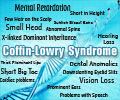Researchers at The Centre for Addiction and Mental Health (CAMH) have found that a gene, called CC2D2A, causes a previously unidentified form of intellectual disability, characterised
A gene called CC2D2A has been linked to a new type of intellectual disability by researchers at The Centre for Addiction and Mental Health (CAMH). This condition is characterized by mental retardation (MR) and retinitis pigmentosa (RP).
This discovery will uncover the developmental and biological processes involved in brain development, and may have future implications in finding ways to diagnose and treat intellectual disabilities.Headed by Dr. John Vincent, scientist at CAMH, the team found that a mutation in CC2D2A causes the production of a shortened protein missing the C2, or calcium-binding, domain. This mutation in the protein leads to faulty cell function, causing MR with RP.
While the majority of genes for intellectual disabilities discovered so far are on the X chromosome, this mutation was located on the autosome (The 22 pairs of non-sex chromosomes that make up the 46 chromosomes in the human body), said Vincent.
Autosomal-recessive inheritance (where both mother and father carry a gene mutation on one chromosome, but both maternal and paternal copies must be passed on to the offspring to cause the disorder) is considered to be relatively common in intellectual disability, even when only four genes causing this type of disability have been identified to date.
"What’s really exciting is that the new gene, CC2D2A, encodes a protein with domains similar to those found in one of the previous four autosomal recessive MR genes. This link could suggest a common function that is essential for normal brain development," says Vincent.
The researchers hope that further research into these findings may provide scientists more clues to understand, diagnose and treat intellectual disabilities.
Advertisement
Source-ANI
RAS/K










